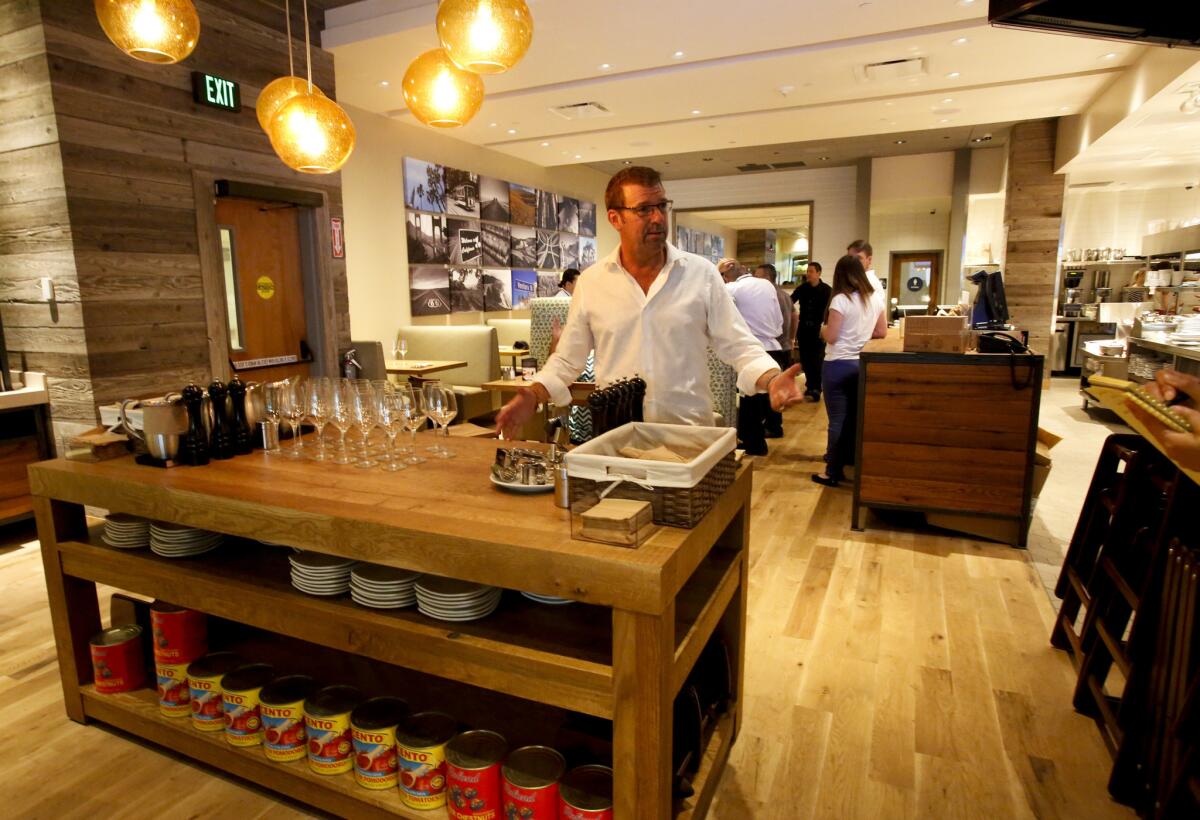New California Pizza Kitchen prototype attempts to ‘de-chain’

- Share via
California Pizza Kitchen, the 28-year-old Los Angeles casual dining chain known for its cookie-cutter mall eateries, is opening a prototype store Wednesday that executives are describing as “rustic,” “rough,” “organic” and “relaxed.”
The new restaurant smack in the center of the Westfield Topanga mall in Canoga Park -- the company’s first area location in five years -- is part of an effort to “de-chain,” Chief Executive G.J. Hart said in an interview last week.
Gone are the black and tan booths, the low-pile carpeting, the glass partitions, the heavier pizza crusts, which have been machine-pressed for more than a decade.
Instead, there’s a revamped, foodie-friendly aesthetic: reclaimed wood detailing including old railroad trestles and barn door tabletops, an herb wall, communal tables and a unisex hand-washing station outside the restrooms.
In full view of luxury neighbors such as Henri Bendel and Burberry and in the path of strolling shoppers, there’s a 1,000-square-foot open-air bar space. An enclosed, 5,351-square-foot eatery is adjacent.
Instead of bolted-down furniture, the tables and chairs can be reconfigured. A new philosophy of “high five hospitality” mean that servers don’t have to wear matching uniforms and read off a script to guests. “Tree free” napkins are created using sugar cane.
The food is more upscale, with lighter, hand-stretched dough, table-side pours of white truffle oil and salted caramel pudding served in canning jars. The once-bloated menu has been trimmed of 22 items and now includes flat breads and items under 600 calories.
CPK, a private company since 2011, is also considering free-standing locations, a departure from the malls and lifestyle centers in which it stores have primarily been situated.
“We’re trying to get away from that very expected, shiny chain feel,” said Clint Coleman, CPK’s chief development officer. “We wanted to take some of that perfect off.”
Analysts attributed the changes at CPK and other full-service chains such as P.F. Chang’s and Mimi’s to post-recession competition.
Diners with limited funds became more aware of available choices, while younger guests became more curious about food sources, said Andrew Freeman, president of hospitality consultancy agency Andrew Freeman & Co.
“It’s more about evolution and staying competitive,” he said of casual-dining chains taking pains to tout their recycling measures and local sourcing efforts. “They are definitively taking their cues from the fine dining restaurants where the local, sustainable movement is now a way of life.”
ALSO:
Southland hot dog, sausage makers cook up ways to prosper
Noodles & Co. IPO: Shares double, on track for year’s best debut
Long John Silver’s serves least healthful meal, food watchdog says
More to Read
Inside the business of entertainment
The Wide Shot brings you news, analysis and insights on everything from streaming wars to production — and what it all means for the future.
You may occasionally receive promotional content from the Los Angeles Times.











